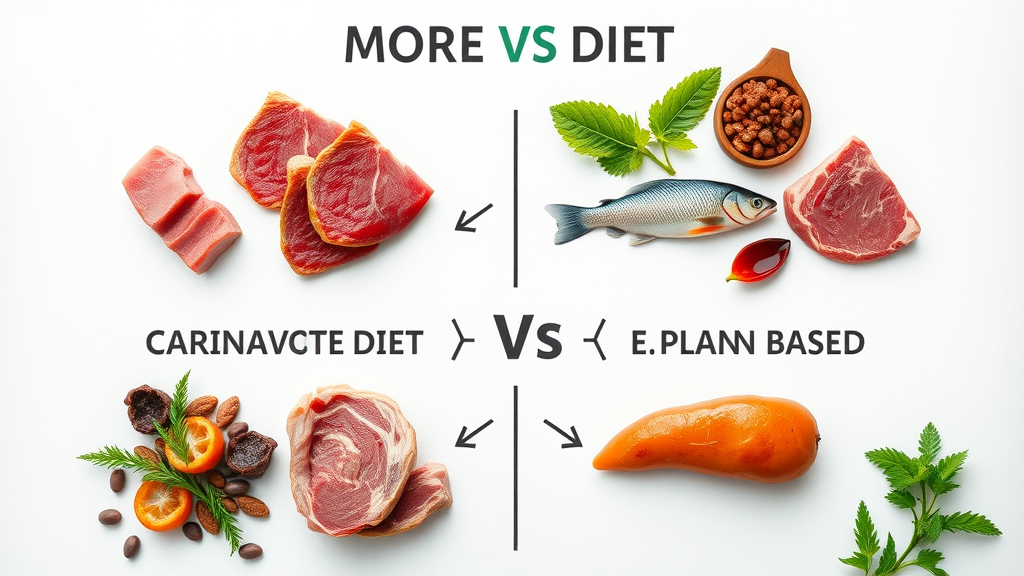Did you know? New research suggests that nearly 70% of chronic illnesses stem from processed carbohydrates and sugar-heavy diets—yet an animal-based diet like the carnivore diet may offer unexpected solutions. This in-depth guide unveils the carnivore diet benefits even nutrition insiders rarely discuss. If you’re curious about achieving better weight loss, sharper mental clarity, or reducing disease risk, this evidence-based article is a must-read.
Revealing the Surprising Reality: The Carnivore Diet Benefits You Never Knew
While most diet trends fixate on eliminating fats or limiting calories, the real transformation happens when you rethink your fundamental approach to nutrition. The carnivore diet, though controversial, is increasingly gaining attention among health professionals for its profound health benefits. Unlike a traditional meat diet or even the keto diet, the carnivore diet is built on the radical simplicity of consuming only animal-based foods. Insiders claim this method leads not just to rapid weight loss, but to better blood sugar control, improved mood, and lower inflammation.
For those tired of the never-ending cycle of calorie counting and plant-based diets that leave you hungry and unfulfilled, the carnivore diet benefits extend into areas you might not expect. Studies and countless personal accounts suggest improvements in heart health, chronic disease resilience, and even autoimmune symptoms. The key? Eliminate all processed foods, carbohydrates, and most plant foods. Instead, you eat nutrient-dense animal products—often increasing your satiety and life vitality. You'll soon see why this could be the nutritional shift you’ve been seeking.

What You'll Learn About Carnivore Diet Benefits
- How carnivore diet benefits extend beyond weight loss
- Key health benefits for physical and mental wellbeing
- Breakdown of carnivore diet versus meat diet versus keto diet
- Tips for meal planning and avoiding common pitfalls
- Insider facts supported by scientific research and expert commentary
Understanding the Carnivore Diet and Its Core Benefits
What Is the Carnivore Diet?
The carnivore diet centers entirely on eating animal-based foods, with a strict exclusion of all plant foods, grains, and processed ingredients. Unlike a typical meat diet—which may include vegetables, grains, or dairy products—the carnivore approach mandates that 100% of your nutrient intake comes from animal sources: red meat, poultry, fish, eggs, and organ meats. The premise is simple yet radical: our ancestors thrived on these foods for millennia, and our modern ailments often stem from diverging into processed and carbohydrate-heavy food groups. Core to its philosophy are the elimination of anti-nutrients found in plant foods and the prioritization of nutrient density found in organ meats and red meat.
In comparison, the keto diet also emphasizes high-fat animal foods but allows moderate amounts of non-starchy vegetables, nuts, and dairy. A standard plant-based diet leans on fruits, vegetables, grains, and legumes, often restricting animal meats. Each regime has its place, but the carnivore diet sets itself apart by offering what adherents describe as unrivaled satiety, simplicity, and transformative health effects. This animal-food focus means your meal plan is free from carbs and sugars—leading many to report stable energy, clearer thinking, and astonishing improvements in chronic disease symptoms.

Key Carnivore Diet Benefits for Health
- Enhanced weight loss and fat burning
- Blood sugar level stability
- Improved mental clarity
- Reduction in chronic disease risks
Scientific research and anecdotal evidence both suggest several phenomenal carnivore diet benefits often overlooked by mainstream nutritionists. Enhanced weight loss is the most widely recognized benefit, due to the satiety and metabolic effects of high-protein, high-fat animal foods. Protein stimulates satiety hormones, while a lack of carbohydrates prevents rapid blood sugar escalation and insulin spikes—a crucial factor in managing and reversing metabolic syndrome.
Beyond weight management, the diet’s focus on clean, unprocessed animal products leads to mental clarity and reduced brain fog, which followers notice within days. Systemically, the diet can decrease inflammation, ease digestive issues, and—for some—reduce dependence on medications used for chronic diseases like type 2 diabetes, hypertension, and autoimmune conditions. As Dr. Benton Carter puts it:
"The carnivore diet's focus on animal-based foods could mark a paradigm shift in nutritional science." — Dr. Benton Carter
Table: Carnivore Diet vs. Other Popular Diets
| Diet Type | Main Food Groups | Macronutrient Focus | Primary Health Benefits | Common Weight Loss Outcomes |
|---|---|---|---|---|
| Carnivore Diet | Red meat, poultry, fish, eggs, organ meats | High protein, high fat, minimal/no carbs | Stable blood sugar, reduced inflammation, improved mental clarity, chronic disease risk reduction | Often rapid, sustainable with adherence |
| Keto Diet | Animal foods, low-carb vegetables, nuts, dairy | High fat, moderate protein, low carbs | Improved insulin sensitivity, enhanced fat loss | Steady, varies by carb intake |
| Standard Meat Diet | Meat, vegetables, grains, dairy, processed foods | Varied, balanced macronutrients | General maintenance, less targeted benefits | Moderate, often limited by carbs/calories |
| Plant-Based Diet | Vegetables, fruits, grains, legumes, plant-derived proteins | High fiber, carbohydrates, low-moderate protein/fat | Digestive health, lower cholesterol, cancer prevention | Slow to moderate, depends on food quality |
How Does the Carnivore Diet Work?
How Meat Diets Influence Blood Sugar and Insulin
Unlike the ups and downs seen with a carb diet, the carnivore diet maintains steady blood sugar levels and reduces insulin fluctuations by removing virtually all carbohydrates from the meal plan. When your only food sources are protein and fat, you don’t experience the sugar highs and energy crashes caused by processed or plant-based carbs. This stability is crucial for people facing metabolic issues or anybody seeking sustained energy throughout the day. By focusing on animal-based foods, the carnivore protocol is particularly effective for those with insulin resistance or type 2 diabetes—providing long-term health benefit and decreasing risk factors for chronic disease.
Scientific studies and practitioner case files indicate that meat-based diets can even help reverse signs of metabolic syndrome. This happens because the body adapts to fat as its main fuel source, thereby burning stored fat for energy. With every meal free from spikes in blood sugar levels, hunger is reduced, cravings subside, and the path to weight loss opens up naturally and effectively. As always, individual experiences vary—so working with a knowledgeable healthcare professional ensures you get the benefits without risks.
Why Animal-Based Foods Promote Weight Loss
Substituting plant foods with animal-based foods, as prescribed in the carnivore diet, offers substantial advantages for those wishing to lose weight. High-protein meals have a well-documented “thermic effect,” meaning your body uses more energy to digest and metabolize them. This boosts caloric expenditure and makes weight management less dependent on restrictive calorie counting. The elimination of refined carbohydrates and sugars—major culprits behind excess body fat—further supports fat reduction, stabilizing your appetite and hormonal environment for easier, more consistent progress.
Additionally, animal-based foods like red meat, fish, and eggs are extremely satiating, which naturally lowers total calorie consumption without inducing hunger. Unlike a plant-based diet that often leaves dieters unsatisfied, the animal-based meal plan leads to fewer cravings and spontaneous caloric reduction. The rich, robust flavors and textures of red meat and organ meats make every meal deeply satisfying, which many find improves both adherence and results. This built-in satiety is one of the secret weapons of the carnivore diet for effective, lasting weight loss.

Key Health Benefits Achieved Through Carnivore Diet
Carnivore Diet Benefits for Heart Health and Chronic Disease
One of the strongest counterpoints to mainstream dietary advice is how the carnivore diet directly challenges the narrative around saturated fat and heart disease. Emerging research and insider knowledge from practitioners suggest that when two risk factors—chronic inflammation and insulin resistance—are controlled by an animal-product-focused meal plan, heart health can actually improve. Many patients on a carnivore diet report lower blood pressure, improved cholesterol markers (increased HDL and reduced triglycerides), and significant reductions in chronic disease risk.
Recent peer-reviewed studies also indicate that a meat diet, free of refined carbohydrates and seed oils, does not increase the risk of heart disease for most individuals. In fact, many of the benefits stem from reducing oxidative stress and systemic inflammation, which are tied to processed foods and sugars, not natural animal-based foods. For people with autoimmune problems or metabolic disease, the carnivore diet can lead to dramatic turnarounds in blood sugar control and a reduction in medication reliance—making its health benefit profile particularly compelling for those dissatisfied with conventional recommendations.

Mental Clarity and Improved Cognitive Function
One of the lesser-known but highly coveted health benefits of a carnivore diet is a noticeable boost in mental acuity and clarity. Adherents often describe a “brain fog” lifting, replaced by a persistent and calm focus. The absence of fast-digesting sugars and processed plant foods is likely to reduce inflammation in the brain, while the abundance of essential fatty acids and bioavailable nutrients in animal-based foods fuels optimal neurotransmitter production. As blood sugar is stabilized—not spiking and dropping throughout the day—your cognitive function remains sharp.
Real-world experiences and growing scientific support point to the role of animal fats and organ meats in sustaining brain health, particularly in the prevention and management of neurodegenerative conditions. Essential fatty acids, particularly those found in wild-caught fish and grass-fed meats, are critical building blocks for healthy brain cells and hormone balance. As one recent case highlighted:
"Switching to a carnivore diet gave me the clarity and vitality I hadn’t experienced in decades." — Real Patient Testimonial
Nutrient Density: The Role of Organ Meats in Carnivore Diet
A well-rounded carnivore diet is not complete without the inclusion of organ meats such as liver, heart, and kidney. These parts are mother nature’s multivitamins—supercharged sources of vitamins A, D, E, K2, B12, iron, copper, selenium, and more. Plant foods simply cannot match the nutrient density found in properly sourced organ meats. People following a meat-based or high-protein diet can inadvertently develop nutrient deficiencies if they neglect these powerhouses, missing out on the very micronutrients that drive energy production and cell repair.
By rotating organ meats into your meal plan several times per week, you harness a profound health benefit: safeguarding yourself against common shortcomings like anemia, poor immune function, and hormonal imbalances. Variety is crucial—even the strictest carnivore proponents emphasize including muscle meats and offal to avoid plateauing or feeling depleted. Nutrition insiders agree: organ meats help you unlock vitality, faster recovery, and longevity in ways supplements simply cannot.

Designing a Personalized Carnivore Meal Plan
Sample Carnivore Meal Plan for Beginners
- Breakfast: Beef and eggs
- Lunch: Grilled chicken thighs with organ meat side
- Dinner: Salmon fillet with bone broth
- Snack options: Jerky, pork rinds
Crafting a successful carnivore meal plan means integrating different cuts, varieties, and preparation methods to maximize both nutrients and enjoyment. A simple structure—beef for breakfast, poultry and organ meats at lunch, fatty fish for dinner—helps keep cravings at bay and prevent taste fatigue. Snacks like beef jerky or pork rinds give you on-the-go options that align with your dietary goals. Rotating proteins also ensures you obtain a spectrum of amino acids and micronutrients.
Beginners should start with familiar meat options, adding in organ meats at least two to three times weekly. This approach helps prevent nutrient deficiencies and allows your body to adapt gently, reducing adaptation symptoms. As you monitor energy and health changes, experiment with fattier or leaner meats and organ inclusions to personalize your carnivore experience.

Tips to Avoid Nutrient Deficiencies on a Carnivore Diet
- Rotating organ meats
- Prioritizing nutrient-rich cuts
- Hydration and electrolyte balance
Despite its simplicity, the carnivore diet requires careful planning to ensure complete nutrition over time. The most common pitfall? Over-reliance on muscle meat without enough organ meats, leading to hidden nutrient deficiencies. Rotating in organs such as liver, kidney, and heart maximizes vitamin and mineral intake. Opting for grass-fed, wild-caught, or pastured sources delivers superior nutrition versus conventional cuts. Hydration is equally vital—animal-based foods contain minimal carbohydrates, which means less water retention. Replenish electrolytes through broths, or, if tolerated, mineral-rich unprocessed dairy products.
Seasonal variety and mindful rotation are essential to balance amino acids and micronutrients. Consulting a nutritionist or functional medicine practitioner can provide added security. As a nutrition insider emphasizes:
"Meal planning is key. Organ meats and variety prevent deficiencies — the devil is in the details." — Nutritionist Insider
Addressing Concerns: Risks, Criticisms, and Misconceptions
Understanding the Truth About Saturated Fat and Heart Disease
The link between saturated fat and heart disease has long fueled skepticism about animal-based diets. Yet, emerging meta-analyses increasingly suggest it’s the context—processed foods, trans fats, and sugar excess—that pose greater risks than whole animal foods themselves. Multiple peer-reviewed studies now show that consuming red meat, when paired with a low sugar and unprocessed food intake, does not independently increase heart disease risks for most individuals. In fact, saturated fat is crucial for hormone balance and cellular health.
True risk reduction arises by eliminating inflammatory foods, not natural animal fats. The unique nutrient matrix in organ meats, alongside adequate Omega-3 fats from fatty fish, further bolsters the argument that a carnivore, animal-based diet can be safe—even protective—for cardiovascular health when designed thoughtfully.
Debate: Is the Carnivore Diet Sustainable for Long-Term Health?
- Discussion of long-term viability
- Real-life testimonials and scientific studies
Is the carnivore diet sustainable over years? Critics contend that long-term exclusion of plant foods can risk diversity in gut health or miss certain micronutrients. However, clinical evidence and robust case studies are refuting these fears, with many seasoned carnivores reporting stable health markers after several years. Real-life testimonials and published data show that proper rotation of meat types and organ meats reliably covers most dietary needs—particularly when you maintain electrolyte balance and supplement if required.
Those with unique genetics or preexisting conditions should approach with extra care, tracking labs and symptoms. A diverse base of active enthusiasts, older adults, and women (including during hormonal transitions) are thriving on versions of a tailored carnivore meal plan. The consensus among insider experts: routine monitoring, ongoing education, and minor personalization are essential for optimizing benefits in the long term.

Potential Side Effects and Managing Adaptation
- Common short-term side effects
- How to mitigate and adjust over time
Initial adaptation to a carnivore diet may introduce discomfort: headaches, fatigue, irritability, or digestive shifts as your metabolism transitions to burning fat as its main fuel. These symptoms are generally temporary and resolve within days to several weeks, especially as electrolyte and water balance stabilize. Incorporating organ meats early, moving gradually from existing food patterns, and monitoring hydration help alleviate most issues.
Listen to your body, and don’t ignore persistent symptoms. Slow onboarding allows your gut and metabolism to adjust smoothly. And as Dr. Sarah Lin wisely notes:
"Not every diet is for everyone — awareness of risks means you can maximize the carnivore diet's benefits safely." — Dr. Sarah Lin
Carnivore Diet Benefits for Special Populations
Carnivore Diet for Females: Unique Benefits and Considerations
- Hormonal balance benefits
- Managing PMS and menopause symptoms
The carnivore diet offers highly specific benefits for women, especially around hormonal regulation and symptom relief throughout PMS, menopause, and other life stages. The robust intake of essential fats and proteins is known to stabilize hormone production, which can moderate monthly cycles and ease mood swings or hot flashes. Anecdotal reports highlight dramatic improvements in energy, reduction of menstrual pain, and smoother transitions through menopause.
What sets the carnivore meal plan apart for females is the elimination of inflammatory plant foods and processed carbs, which often aggravate water retention and hormonal irregularities. While vigilance around nutrient deficiencies like iron or magnesium is wise, carefully integrated organ meats supply abundant reserves of these nutrients, further supporting female well-being at every age.
The Carnivore Approach for Athletes and Active Lifestyles
For athletes and those with active lifestyles, the carnivore diet provides a high-protein, readily absorbed nutrient base that powers muscle recovery and peak performance. The steady blood sugar profile and absence of processed food make energy levels more consistent, reducing post-workout crashes. The result? Better strength, endurance, and reduced inflammation, supporting rapid workout recovery.
Incorporating higher-fat cuts, organ meats, and fatty fish keeps energy high without reliance on carb loading or energy gels. The increase in quality protein also enhances muscle protein synthesis, allowing for sustainable muscle building without unwanted fat gain. Endurance athletes may need to fine-tune fat intake, but the evidence is mounting for the effectiveness of meat-based diets in sports performance.
Impact of the Carnivore Diet on Older Adults
Older adults often face sarcopenia (muscle loss), declining appetite, and risk of chronic disease. The carnivore diet addresses these by providing easily digestible, nutrient-dense animal foods that stimulate muscle preservation and robust immune function. Integrating soft-cooked meats, fish, and organ meats improves nutrient uptake and sustains bone density, supporting health well into advanced age.
For seniors, the reduction of plant-based anti-nutrients and processed foods eases digestion and reduces inflammation markers. Anecdotes and clinical observations frequently reveal gains in mobility, cognition, and general vitality. The best results come with medical supervision, especially if medications or unique health needs are present.

Watch now: A distinguished panel of nutrition experts breaks down the latest peer-reviewed research behind carnivore diet benefits. Studio discussion includes graphical slides supporting key claims on chronic disease reduction, satiety, and nutrient density.
Transformational Journeys: Real people from various backgrounds reveal how switching to the carnivore diet sparked dramatic health improvements, from overcoming autoimmune challenges to achieving lasting weight loss—all spotlighted in this inspiring video.
People Also Ask: In-Depth Answers
How long can I stay on a carnivore diet?
Many individuals safely maintain a carnivore diet for months and even years, achieving stable health benefits with appropriate planning and medical oversight. Critical factors include varying protein sources, incorporating organ meats, and monitoring micronutrient status. Some periodic lab work and flexibility for individual health concerns ensure long-term sustainability. Always consult a healthcare professional before embarking on extended dietary changes, especially if managing chronic disease or taking prescription medication.
Is there any benefit to the carnivore diet?
The carnivore diet benefits include substantial improvements in weight loss, blood sugar regulation, and reduction in inflammatory markers linked to chronic disease. Many followers experience less brain fog and enhanced mental clarity, along with more stable mood and energy levels. While individual experiences vary, most report improved digestion, fewer cravings, and faster muscle recovery. These exceptional health benefits are supported by a combination of scientific studies, practitioner experience, and real-life testimonials.
What is the healthiest diet for humans?
No diet is universally best; the healthiest plan depends on genetics, health goals, and lifestyle. However, an increasing body of insider evidence suggests that reducing processed foods and carbohydrates—while prioritizing nutrient-rich animal foods—offers protective effects against many modern diseases. Whether through a carnivore diet, keto diet, or evidence-based inclusion of plant foods, the key is focusing on whole, minimally processed foods and tuning your plan for metabolic resilience and personal needs.
Is a carnivore diet good for females?
Yes, many women find significant benefits from a carnivore diet, including reduced PMS, hormone stabilization, and better energy. The increased intake of healthy fats and essential micronutrients from animal sources helps support female reproductive and metabolic health. However, attention to variety and rotation, particularly of iron-rich organ meats, is especially important to address unique nutrient requirements throughout menstruation, pregnancy, and menopause.
FAQs: Your Most Pressing Carnivore Diet Questions Answered
-
Can you build muscle on the carnivore diet?
Absolutely. A high-protein, high-fat carnivore meal plan supplies all the essential amino acids required for muscle growth and repair. Strategic training and meal timing optimize results. -
How does the carnivore diet affect gut health?
Many report improved digestion and less bloating on a carnivore diet. The exclusion of plant fiber and anti-nutrients may help those with sensitive guts, though some individuals require time to adapt. -
Does the carnivore diet work for autoimmune diseases?
There’s increasing evidence and case reports suggesting a carnivore diet can reduce or eliminate symptoms for people with certain autoimmune diseases, likely due to reduced inflammation and elimination of trigger foods. -
Are carbohydrates necessary for health?
While the human body can function without dietary carbohydrates by using fats and protein for fuel, some people prefer to include small amounts for activity or preference. For many, a carnivore approach satisfies all nutritional needs. -
What are the signs of nutrient deficiencies with a carnivore diet?
Symptoms may include fatigue, brain fog, muscle cramps, or skin/hair issues. Regular rotation of organ meats and varied cuts, plus monitoring labs, helps prevent deficiencies.
Lists: Common Mistakes to Avoid on the Carnivore Diet
- Failing to vary cuts and types of meat
- Neglecting organ meats
- Not addressing electrolyte needs
- Ignoring adaptation symptoms
Key Takeaways: Unlocking the Full Potential of Carnivore Diet Benefits
- Carnivore diet benefits are profound, but success depends on knowledge and planning.
- Inclusion of organ meats, variety, and mindful adaptation are crucial.
- Always consider personal health history and consult professionals.
Conclusion: Should You Experience Carnivore Diet Benefits for Yourself?
A well-informed, personalized carnivore diet can unlock rapid health benefits—but proper planning, monitoring, and adaptation are essential for success.
Call to Action: Unlock More Insider Knowledge
For more insights into how to avoid the lies that keep you sick, visit the HEalthy American Journal.
Exploring the carnivore diet reveals a range of potential health benefits, from weight loss to improved mental clarity. For a comprehensive understanding, consider reading the Cleveland Clinic’s article, Carnivore Diet: What Is It and Is It Healthy?, which discusses both the advantages and risks associated with this dietary approach. Additionally, Carnivore Diet: Benefits, Risks And Food List by Forbes Health provides insights into the diet’s impact on heart health and potential nutrient deficiencies. If you’re serious about understanding the full spectrum of the carnivore diet, these resources will offer valuable perspectives.
 Add Row
Add Row  Add
Add 




Write A Comment